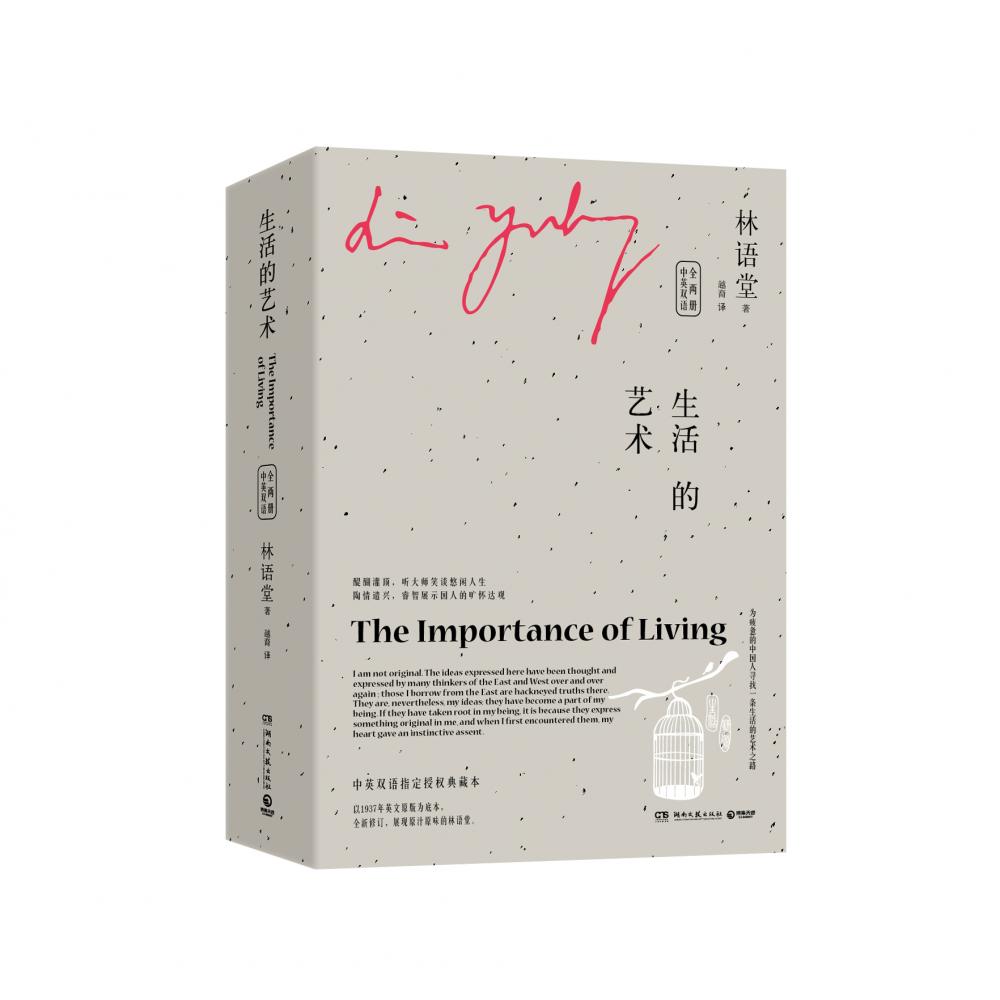
出版社: 湖南文艺
原售价: 88.00
折扣价: 59.84
折扣购买: 生活的艺术(全两册)中英双语
ISBN: 9787540480813

林语堂(1895-1976)一代国学大师,曾多次获得诺贝尔文学奖提名的中国作家。著有《生活的艺术》《吾国与吾民》《京华烟云》等,并将孔孟老庄哲学和陶渊明、李白、苏东坡、曹雪芹等人的文学作品英译推介海外,是第一位以英文书写扬名海外的中国作家,也是集语言学家、哲学家、文学家于一身的知名学者。
本书是一种私人的供状,供认我自己的思想和生活所得的经验。我不想发表客观意见,也不想创立不朽真理。我实在瞧不起自许的客观哲学;我只想表现我个人的观点。我本想题这书的名字为“抒情哲学”,用抒情一词说明这里面所讲的是一些私人的观念。但是这个书名似乎太美,我不敢用,我恐怕目标定得太高,即难于满足读者的期望,况且我的主旨是实事求是的散文,所以用现在的书名较易维持水准,且较自然。让我和草木为友,和土壤相亲,我便已觉得心意满足。我的灵魂很舒服地在泥土里蠕动,觉得很快乐。当一个人悠闲陶醉于土地上时,他的心灵似乎那么轻松,好像是在天堂一般。事实上,他那六尺之躯,何尝离开土壤一寸一分呢? 我颇想用柏拉图的对话方式写这本书。把偶然想到的话说出来,把日常生活中有意义的琐事安插进去,这将是多么自由容易的方式。可是不知什么缘故,我并不如此做。或者是因我恐怕这种文体现在不很流行,没有人喜欢读,而一个作家总是希望自己的作品有人阅读。我所说的对话,它的形式并不是像报纸上的谈话或问答,或分成许多段落的评论;我的意思是指真正有趣的、冗长的、闲逸的谈论,一说就是几页,中间富于迂回曲折,后来在料不到的地方,突然一转,仍旧回到原来的论点,好像一个人因为要使伙伴惊奇,特意翻过一道篱笆回家去一般。我多么喜欢翻篱笆抄小路回家啊!至少会使我的同伴感觉我对于回家的道路和四周的乡野是熟识的……可是我总不敢如此做。 THIS is a personal testimony, a testimony of my own experience of thought and life. It is not intended to be objective and makes no claim to establish eternal truths. In fact I rather despise claims to objectivity in philosophy; the point of view is the thing. I should have liked to call it “A Lyrical Philosophy,” using the word “lyrical” in the sense of being a highly personal and individual outlook. But that would be too beautiful a name and I must forego it, for fear of aiming too high and leading the reader to expect too much, and because the main ingredient of my thought is matter-of-fact prose, a level easier to maintain because more natural. Very much contented am I to lie low, to cling to the soil, to be of kin to the sod. My soul squirms comfortably in the soil and sand and is happy. Sometimes when one is drunk with this earth, one's spirit seems so light that he thinks he is in heaven. But actually he seldom rises six feet above the ground. I should have liked also to write the entire book in the form of a dialogue like Plato's. It is such a convenient form for personal, inadvertent disclosures, for bringing in the significant trivialities of our daily life, above all for idle rambling about the pastures of sweet, silent thought. But somehow I have not done so. I do not know why. A fear, perhaps, that this form of literature being so little in vogue today, no one probably would read it, and a writer after all wants to be read. And when I say dialogue, I do not mean answers and questions like newspaper interviews, or those leaders chopped up into short paragraphs; I mean really good, long, leisurely discourses extending several pages at a stretch, with many detours, and coming back to the original point of discussion by a short cut at the most unexpected spot, like a man returning home by climbing over a hedge, to the surprise of his walking companion. Oh, how I love to reach home by climbing over the back fence, and to travel on bypaths! At least my companion will grant that I am familiar with the way home and with the surrounding countryside... But I dare not.